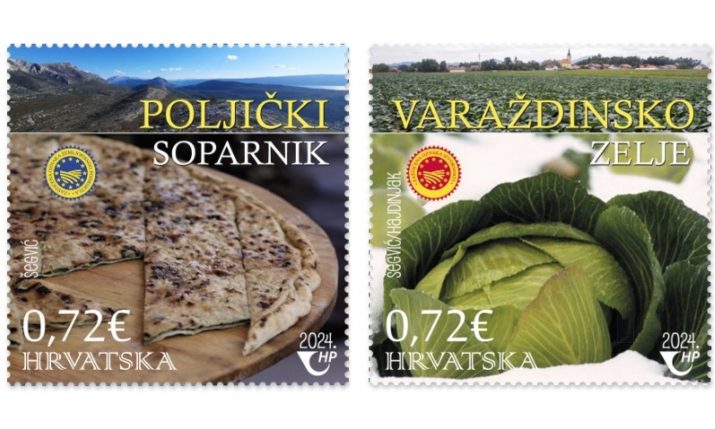Renowned Croatians feature on postage stamps
- by croatiaweek
- in Entertainment
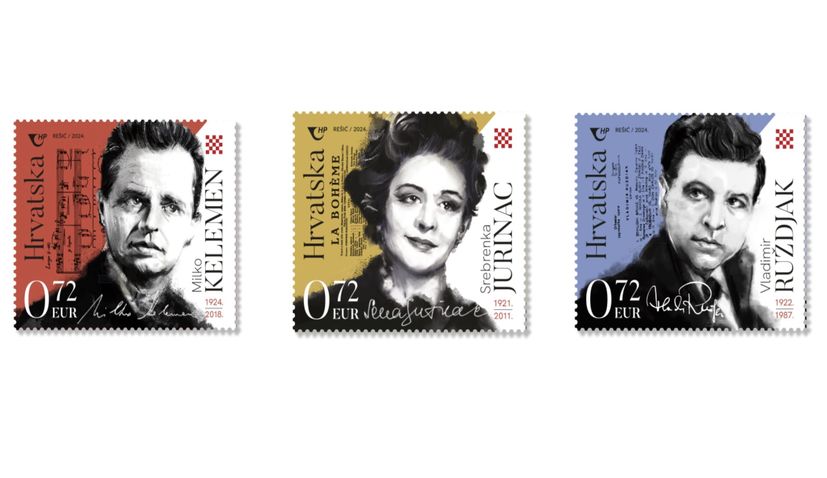
Croatian Post
New release in the series of commemorative postage stamps
ZAGREB, April 26, 2024 – Croatian Post will issue new commemorative postage stamps on April 29, 2024, as part of the “Renowned Croats” series.
The motifs on this year’s series of commemorative stamps, designed by Sabina Rešić from Zagreb, feature Croatian musicians Srebrenka (Sena) Jurinac, Milko Kelemen, and Vladimir Ruždjak.
The value of the stamps is 0.72 euros per motif, printed in an edition of 25,000 copies per motif and in sheets of 20 stamps each. Croatian Post has also printed a first-day cover (FDC). The new commemorative stamps can be purchased at post offices or online at the website https://www.epostshop.hr/.
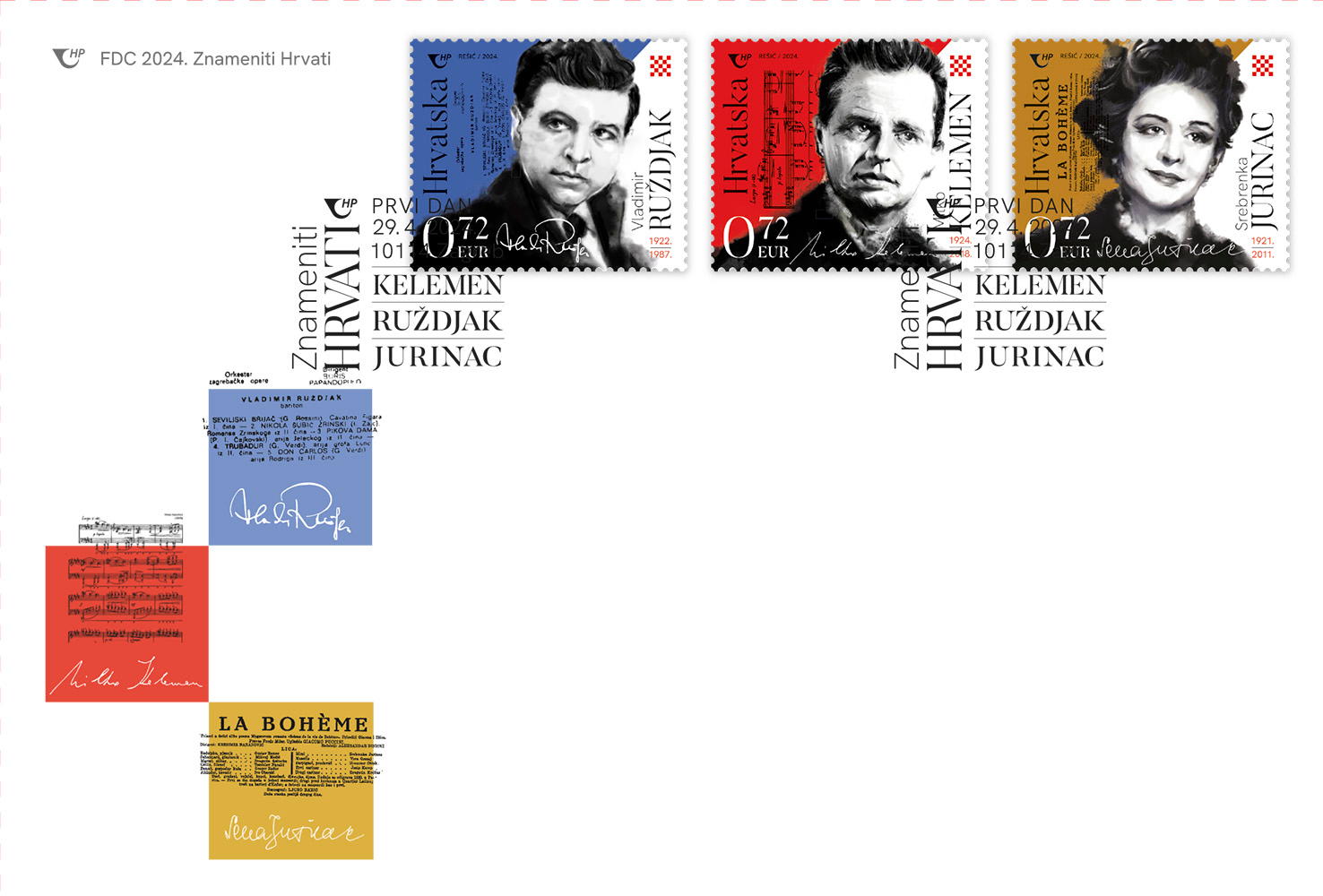
(Croatian Post)
The accompanying leaflet text for the commemorative stamps was written by Erika Krpan, a musicologist and member of the Croatian Musicological Society.
Srebrenka (Sena) Jurinac (Travnik, October 24, 1921 – Augsburg, November 22, 2011), a soprano and a distinguished Croatian vocal artist, is among the few special Croatian singers who have conquered the most prestigious world opera stages.
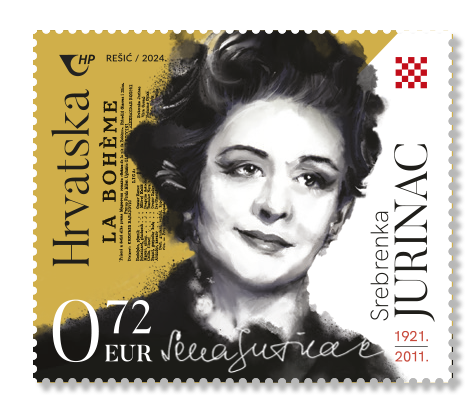
(Croatian Post)
Educated in Zagreb, she studied singing at the Music Academy in Zagreb under Marija Kostrenčić, and even during her studies, she performed at the Croatian National Theatre, attracting attention with the beauty of her refined musicality, particularly in several roles, especially in the title role at the premiere of Boris Papandopulo’s opera “Sunčanica” held in 1942 under the conductorship of the composer and directed by Branko Gavella.
A year later, Oktavijan Miletić entrusted her with the role of Sidonija Erdődy in his film “Lisinski”. In 1944, she successfully auditioned at the Vienna State Opera, where she remained until her retirement in 1982.
She not only portrayed numerous roles but also had an international career that took her from Vienna to major world opera stages; she performed at La Scala in Milan, the Paris Opera, Covent Garden in London, the opera houses in Brussels, Zurich, and then in San Francisco, Chicago, Buenos Aires, Sydney, and at festivals in Edinburgh, Glyndebourne (regularly since 1949), Florence (Maggio musicale), the Bayreuth Festival (1957), and Wiesbaden.
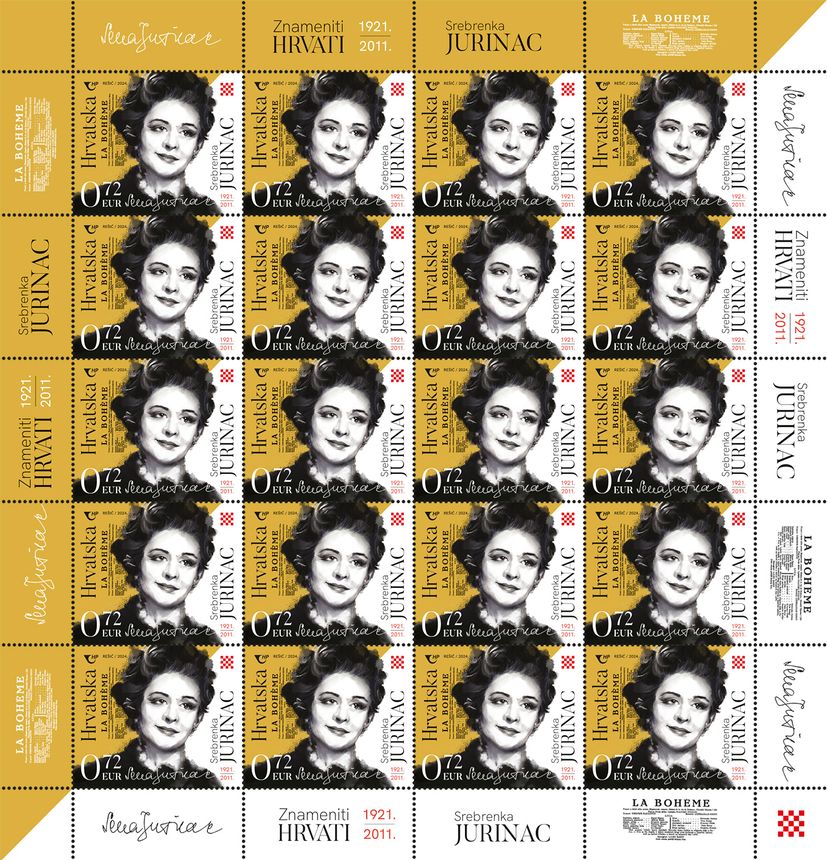
(Croatian Post)
In her home theater, she interpreted most of the soprano roles, gradually transitioning from lyrical to dramatic roles. Throughout her career, she collaborated with the greatest conductors of the 20th century, from L. Matačić and H. von Karajan, under whose baton she performed at the Salzburg Festival in the role of Cherubino in W. A. Mozart’s “Le nozze di Figaro”, to W. Furtwängler, O. Klemperer, H. Knappertsbusch, and E. Kleiber.
Croatian audiences surely remember her last performance in Croatia when, at the Varaždin Baroque Evenings in 1978, accompanied by the Zagreb Soloists, she performed an aria from Handel’s opera “Giulio Cesare,” bidding farewell to her homeland forever.
Milko Kelemen (Podravska Slatina, March 30, 1924 – Stuttgart, March 8, 2018), a composer whose oeuvre can somewhat be considered a paradigm of modernity in Croatian music in the second half of the 20th century, was a doyen of Croatian musical creation, the recipient of numerous awards and honors, both in Croatia and in Germany, which became his second home from the early 1970s.
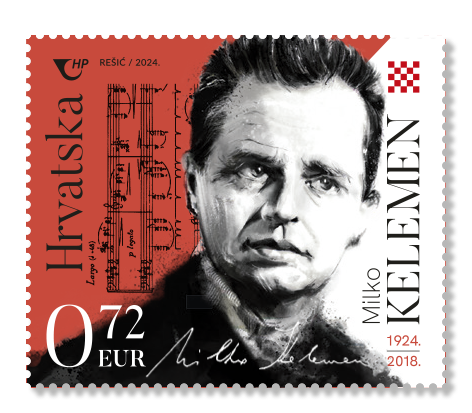
(Croatian Post)
He completed his primary and secondary education in Virovitica, and studied composition in 1951 under S. Šulek at the Music Academy in Zagreb; he furthered his studies in Paris, Freiburg, and Munich. From 1953, he was an assistant and lecturer at the Music Academy in Zagreb, and from 1968 to 1970, Composer in Residence in Berlin. From 1969 to 1972, he taught at the Robert Schumann Conservatory in Düsseldorf, and from 1973, he was a composition professor at the Stuttgart University of Music.
He was the founder and first president of the Zagreb Music Biennale, an international festival of contemporary music (1961), and from 1981 until his death, its honorary president. As a conductor, he guest-conducted and as a guest professor, he taught in numerous countries worldwide. In 1988, he was elected as a corresponding member of the Yugoslav Academy of Sciences and Arts, and in 1995, the Milko Kelemen Days were established in Slatina as an annual event.
Among Kelemen’s numerous awards are three Zagreb City Awards (1955, 1957, 1960), the Beethoven Prize of the City of Bonn (1961), the Bernhard Sprengel Award in Hannover (1969), the Grosses Bundesverdienstkreuz for culture of the SR Germany (1973), the Chevalier des arts et des lettres of the Republic of France (1980), and the Vladimir Nazor Award for Lifetime Achievement (1984).
“Energy in music should be understood as an applied rather than a pure concept, which appears in various forms, depending on the different assumptions of different types of musical expression. The law of conservation of energy is inherent in music,” Kelemen writes in his book “Worlds of Sound.” Indeed, accustomed to the inspiring interpretation of the law of energy in music in the works of this author, we sometimes equate the playful character of certain aspects of his manuscript with energy.
Therefore, the part of Kelemen’s work that manifests the rigidity of notation always somewhat bewilders with the serene seriousness of the notation and the extremely controlled, almost suppressed energy in each of his compositions.
Vladimir Ruždjak, baritone, composer, opera director (Zagreb, November 21, 1922 – Zagreb, October 9, 1987), is one of the greatest Croatian musicians of the 20th century. He graduated from the Music Academy in Zagreb in 1946 with a degree in solo singing in the class of Professor Milan Reizer as the first post-war graduate of that department.
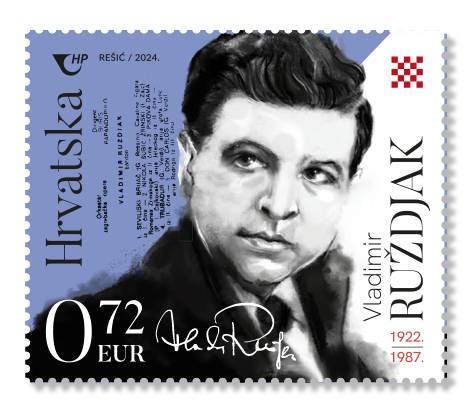
(Croatian Post)
He made his debut on July 4, 1946, at the Croatian National Theatre in Zagreb in Gianni Schicchi by G. Puccini, and from 1948 to 1955, he was permanently engaged at the Croatian National Theatre as an opera soloist. In 1948, he won the Yugoslav Competition of Musical Artists in Zagreb, in 1949, the International Singing Competition in Geneva, and in 1950, he won the 1st prize at the International Singing Competition in Verviers (Belgium). He made his debut on November 14, 1954, in Hamburg in Verdi’s “Il trovatore”; from 1954 to 1972, he was an opera principal in Hamburg, where he played numerous leading roles and participated in several world premieres.
At the same time, he appeared as a guest on numerous major world opera stages (San Francisco Opera, Sadler’s Wells Opera, Covent Garden in London, Bolshoi Theatre in Moscow, etc.), and from 1962 to 1964, he was a member of the Metropolitan Opera in New York; he was also a regular guest at the Croatian National Theatre in Zagreb and numerous concert stages in the country and abroad, developing his career as a concert singer.
He performed over a hundred opera roles and had an extensive concert repertoire. For his rich international artistic activity, he was awarded the honorary title of Kammersänger on August 21, 1962. In the mid-1960s, he decided to add directing to his compositional and performing activities, and in the following years, he realized about twenty opera productions. In 1970, he began teaching; as a regular professor at the Music Academy in Zagreb, he trained many quality singers.
Whatever artistic activity he engaged in, Ruždjak dedicated himself completely to it, as the artistic act always implied full intellectual and emotional engagement for him. An emphasized need for synthesis, for finding a focus where all his aesthetic and moral postulates would be concentrated, was indispensable. He learned with ease, with high performance standards.
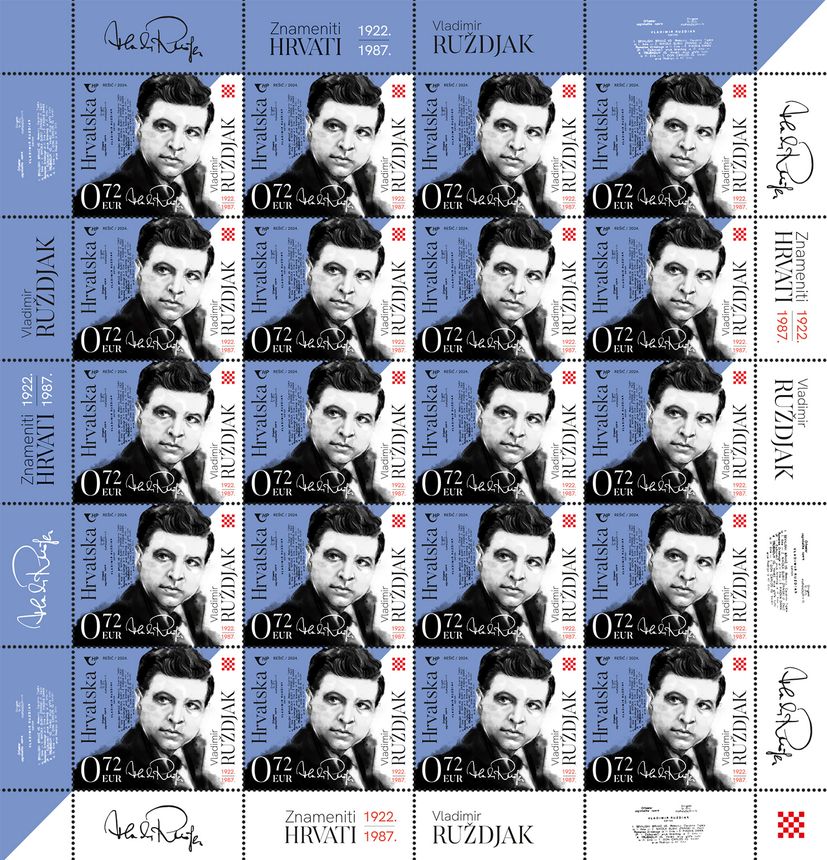
(Croatian Post)
The renowned beauty of his baritone was the foundation upon which he applied his excellent technical skills and outstanding musicality, which was particularly evident in concert performances, especially in solo singing, to which he devoted most of his compositional opus. In his compositions, he relied mostly on folk sources.

